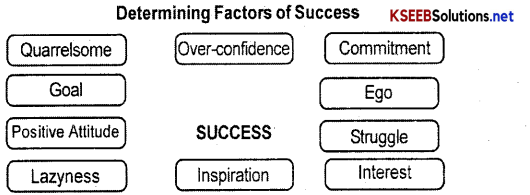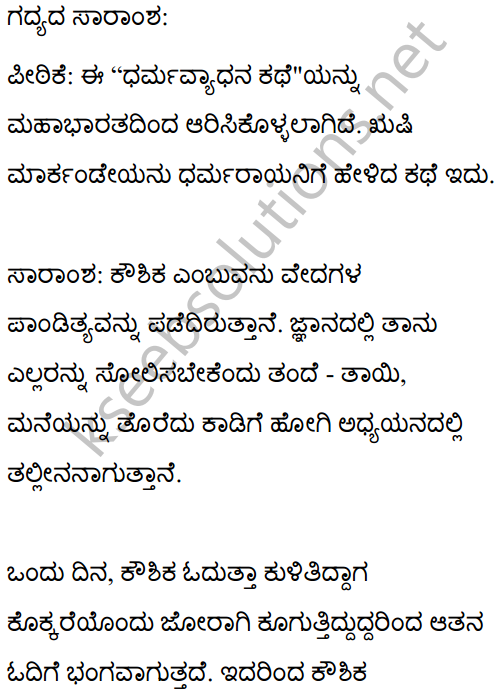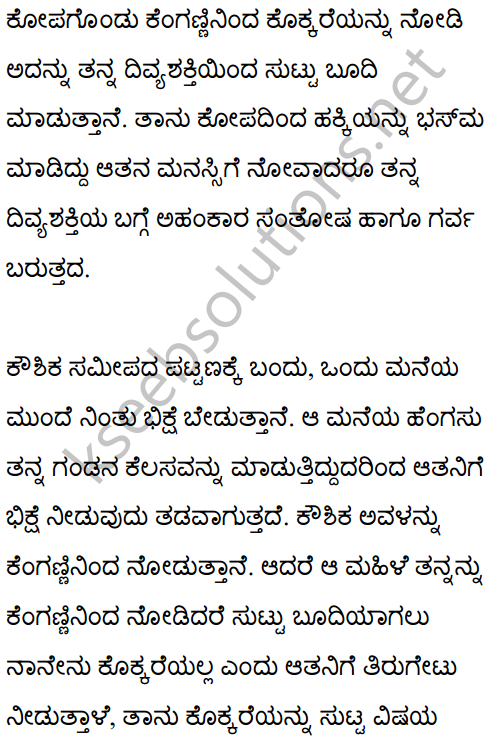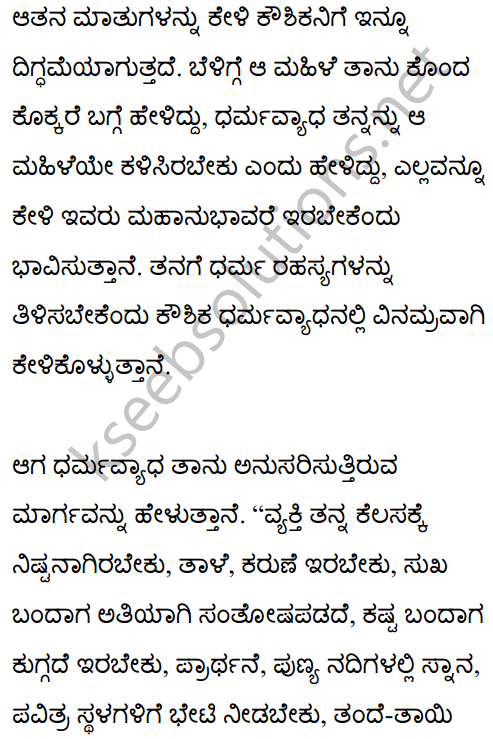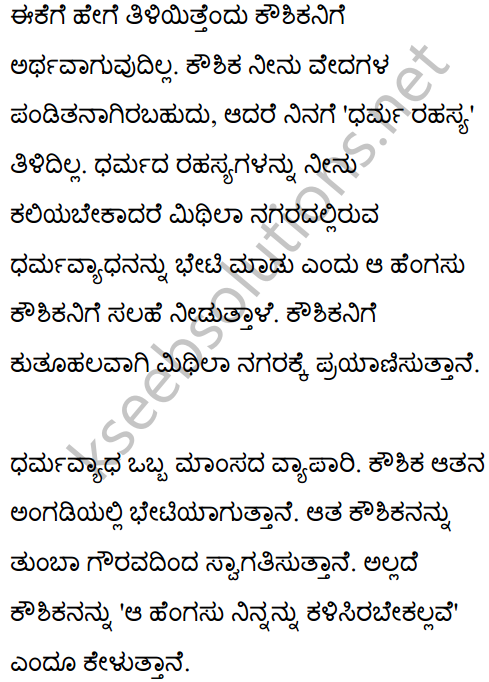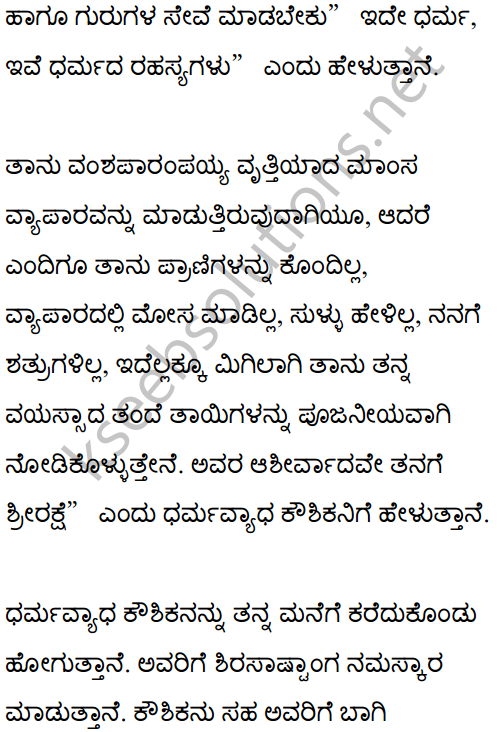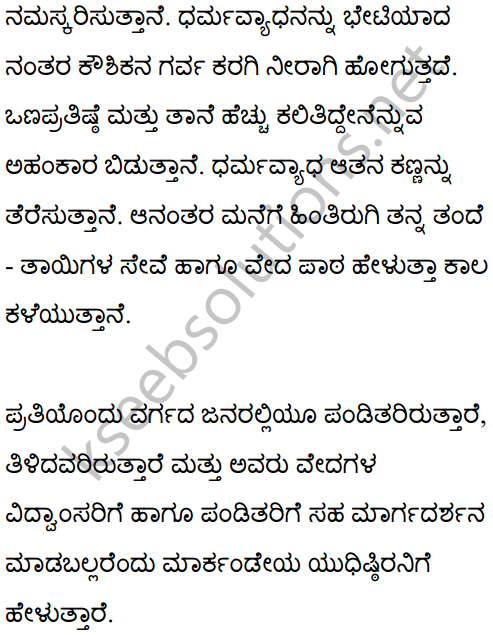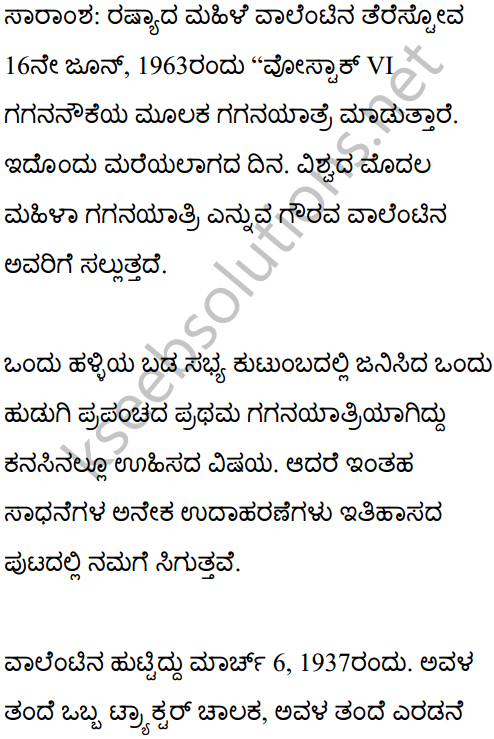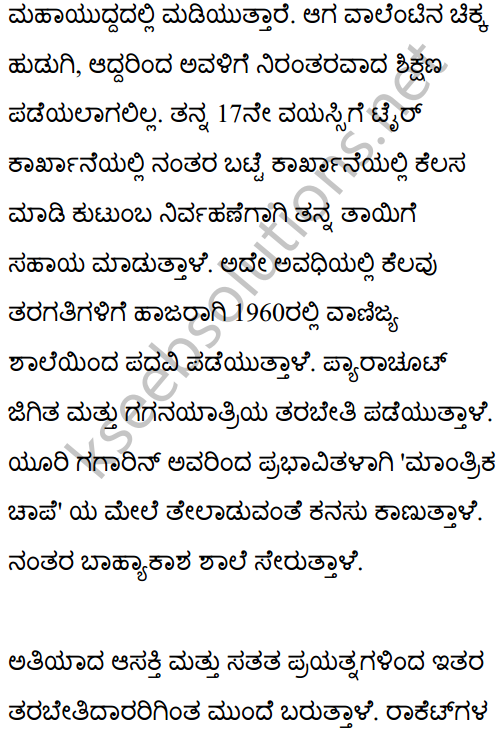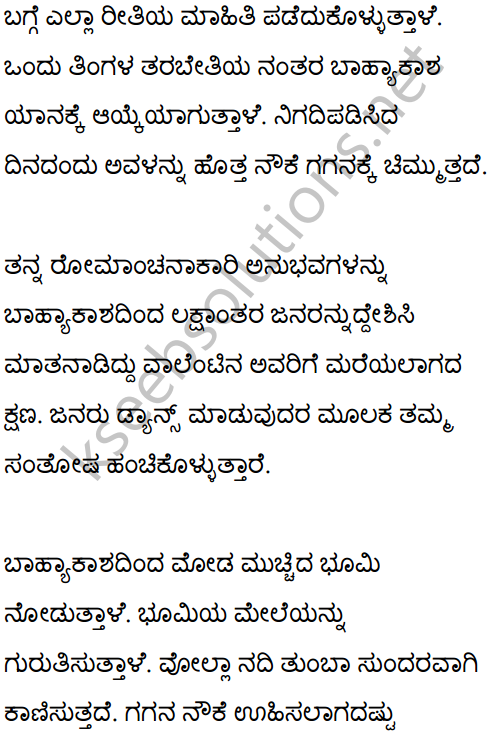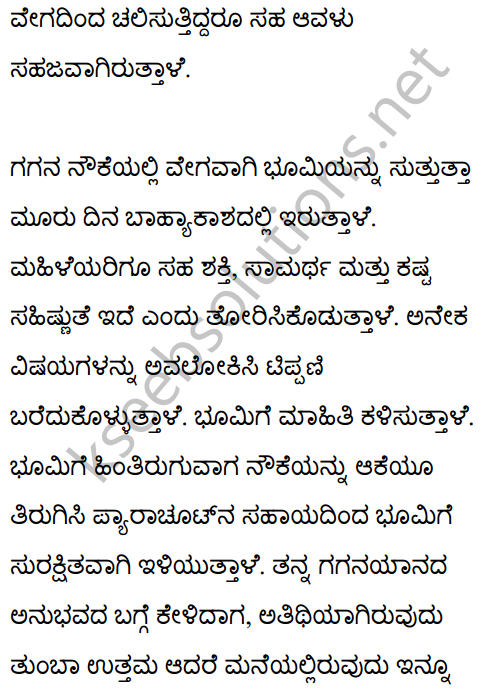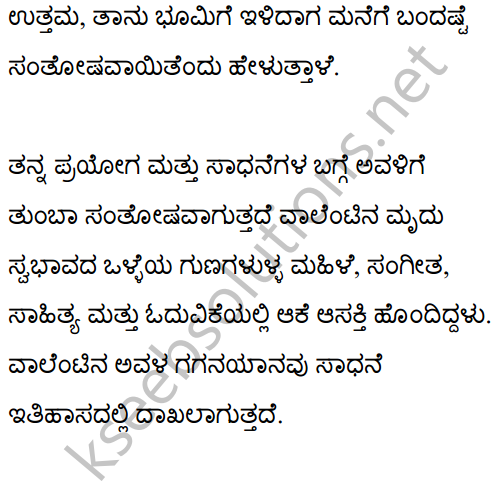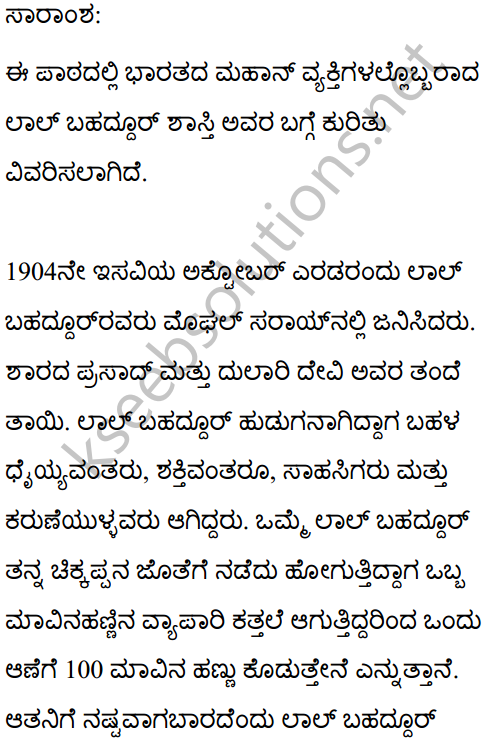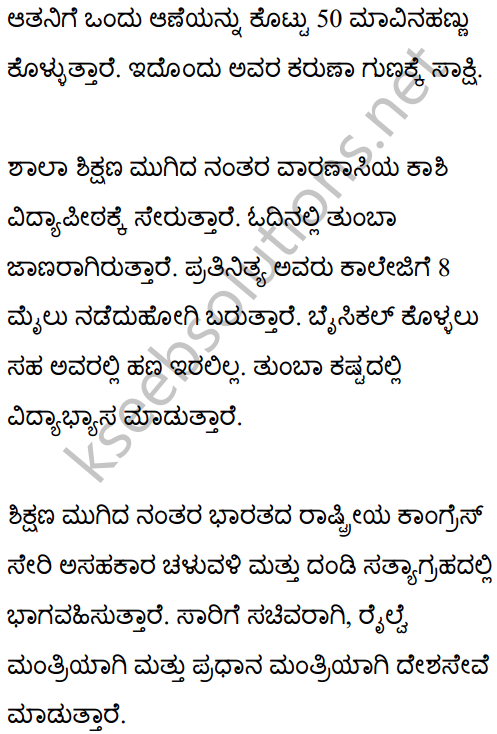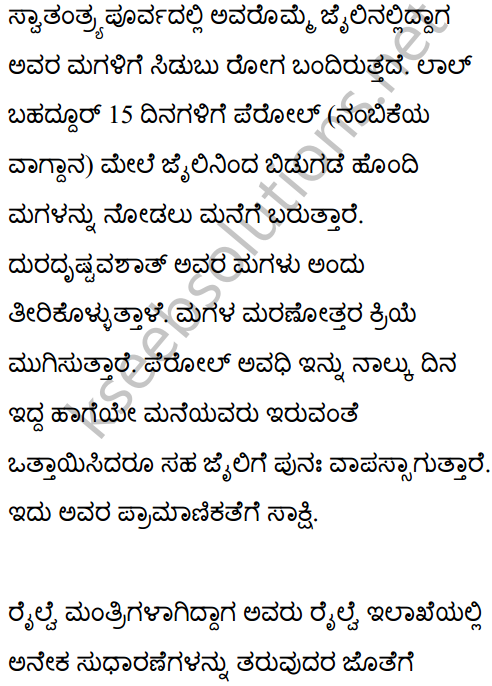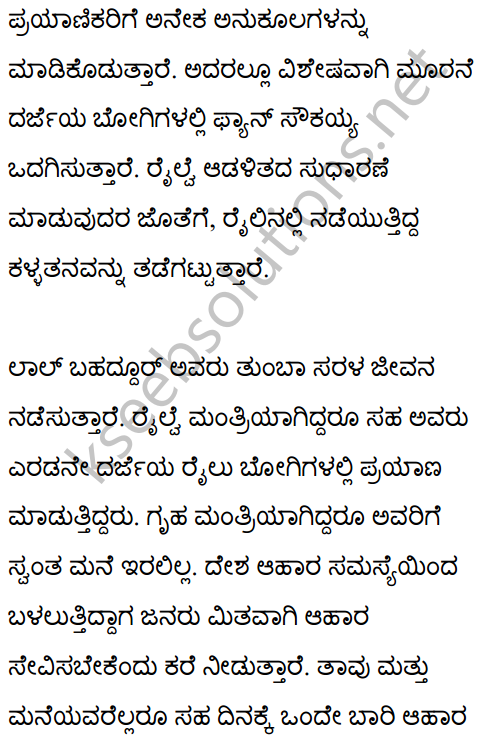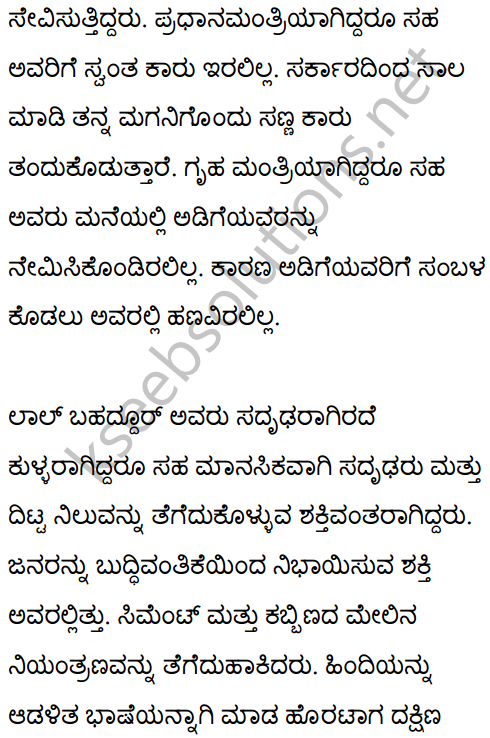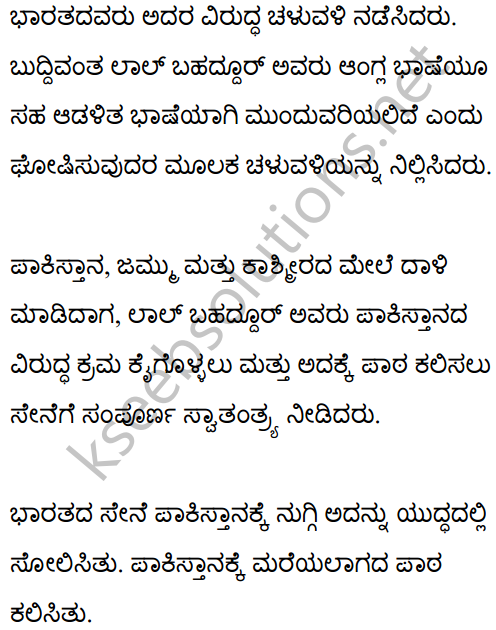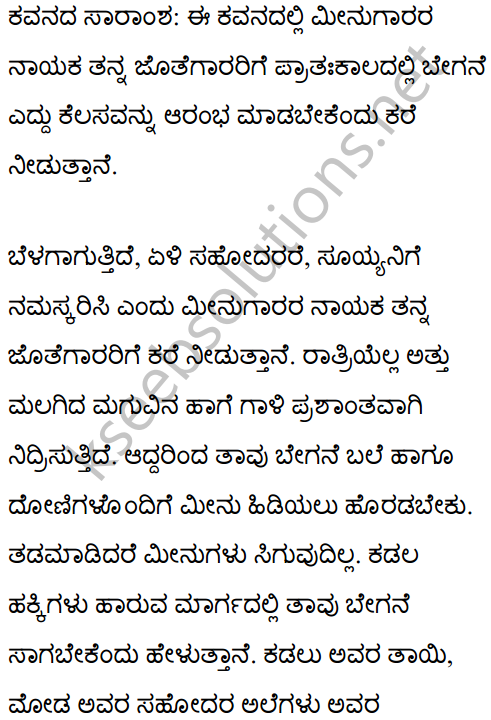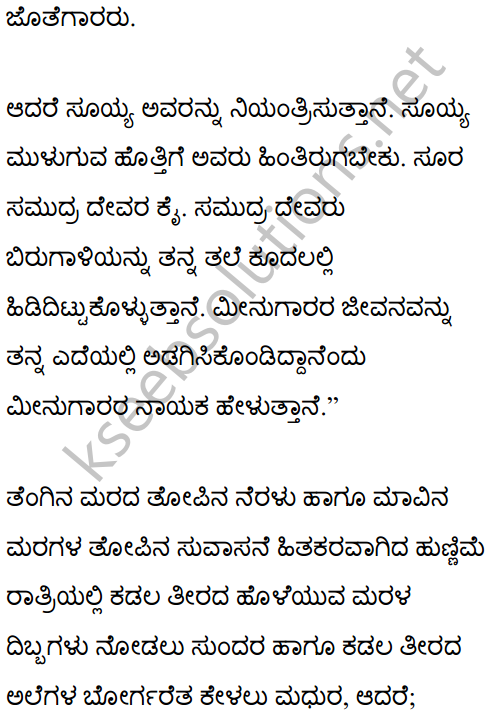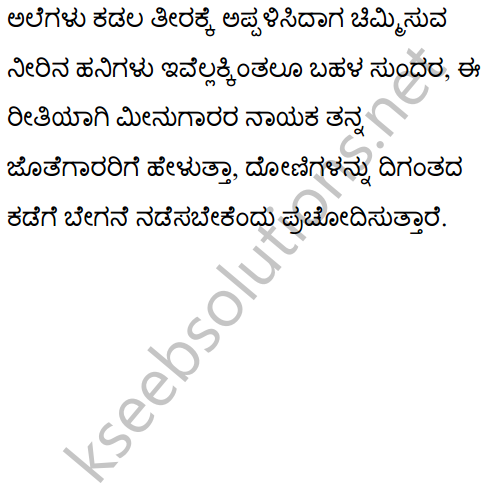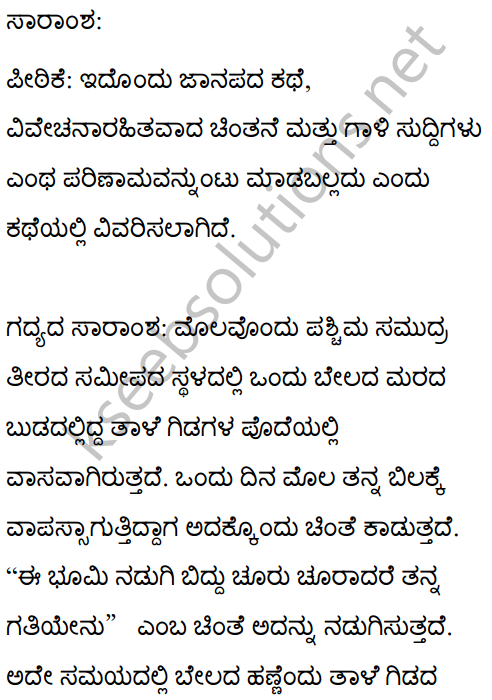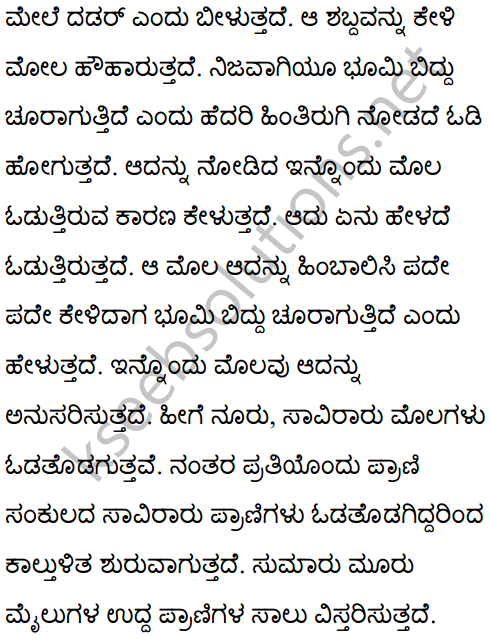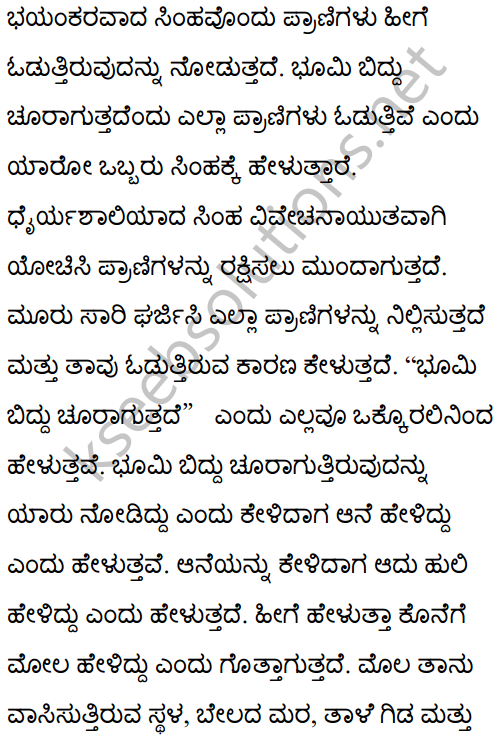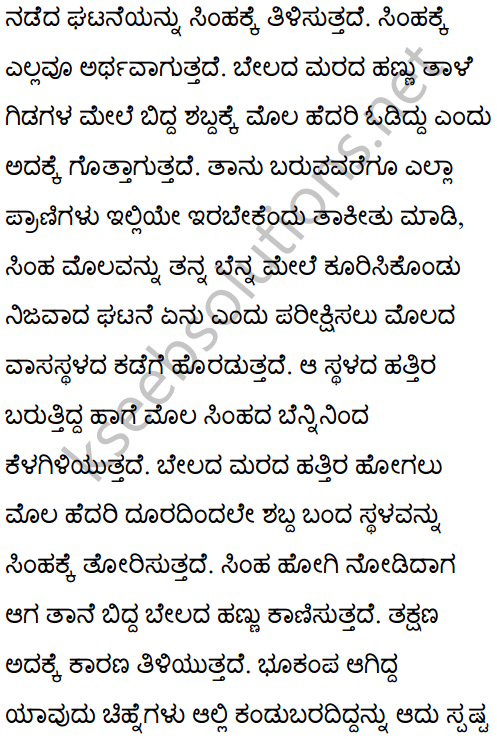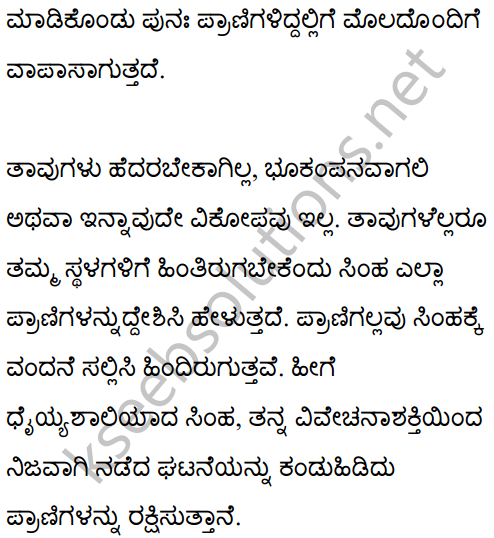KSEEB 8th English The Model Millionaire Lesson Notes Summary Questions and Answers
Pre reading task
Question 1.
What makes a person rich and successful? Is it luck or hard work?
Answer:
To a great extent its only hard work that leads to success and luck always favours those who work hard.
Question 2.
One can afford to be generous only if one is rich”. Do you agree with this statement? Give reasons.
Answer:
It is generally easier for a rich person to be generous. It doesn’t affect him adversely if he shares a mite of his fortune. Unfortunately, many rich people are not generous.
On the other hand, even if a poor man wants to be generous he has nothing to offer but himself-the services that he can provide to others. It is service that cannot be repaid while money that is borrowed can be repaid.
![]()
Question 3.
Do you know what irony is? Have you read stories with ironic endings? In groups take up one story with irony as an element and discuss.
Answer:
The use of words to express something different from and often opposite to their literal meaning is known as irony. Some of the famous stories with irony are Pride and Prejudice, the Gift of the Magi, Oedipus etc.
Textbook Questions and Answers
I. Comprehension
I. Answer the following questions in two or three sentences each
Question 1.
What sort of man was Hugie Erskine?
Answer:
Hughie Erskine was a good looking man who was liked and admired by both men and women. He was kind but not clever and did not have sufficient money. He constantly changed jobs and did everything possible to earn a decent living, but in vain.
Question 2.
What were the various jobs that he took up? Why?
Answer:
He worked on the stock exchange for six months, as a tea merchant for over six months and sold sherry. Probably, not being clever, he could not succeed in any of the jobs. Therefore he constantly changed jobs.
Question 3.
What was the condition laid down for Hughie to marry Laura?
Answer:
The Colonel, Laura’s father, demanded that Hughie get 10,000 pounds of his own if he wanted to marry his daughter.
Question 4.
Who was Alan Trevor? What was Trevor doing when Hughie called on him?
Answer:
Alan Trevor was a clever painter and a friend of Hughie. When Hughie called on him, Alan was busy finishing a frill sized portrait of a beggar- man.
Question 5.
How was the model beggar dressed?
Answer:
The model beggar-man had a ragged brown coat over his shoulder and his boots were patched and well worn.
![]()
Question 6.
What did Hughie feel the model should get? Why?
Answer:
Hughie felt that the model should get a share of the amount that Alan got for the painting. This was because he felt that even the model worked equally hard as the artist.
Question 7.
Why did Hughie feel sorry for the beggar-man?
Answer:
The old beggar-man looked so lonely and sad that Hughie felt sorry for him. Therefore he gave him a sovereign, the only coin he had because he felt that the beggar needed it more than himself.
Question 8.
What did Hughie give the old beggar – man?
Answer:
Hughie gave the old beggar-man a sovereign.
Question 9.
What did Alan Trevor tell Hughie when he met him at the Palette Club?
Answer:
Alan Trevor told Hughie that the old beggar man had taken a liking for him and had enquired about Hughie in detail.
Question 10.
Alan says “He’ll invest your sovereign for you Hughie,” How do you think the Baron could have invested the sovereign for Hughie?
Answer:
He would probably invest the sovereign for Hughie in a bank and pay him the interest every six months.
II. Answer the following questions in five or six sentences each:
Question 1.
“That old beggar, as you call him, is one of the richest men in Europe”. Name the richest man referred to. How is he described to Hughie?
Answer:
The richest man referred to here is Baron Hausberg. He is described as “One of the richest men in Europe who could buy London the next day and would never miss his money. He owned a house in every capital, ate off gold plates and could even prevent Russia going to war when he chose”.
Question 2.
Describe how Hughie Erskine was able to marry Laura Merton.
Answer:
Once, at the studio of his painter friend Alan, Hughie saw a poor beggar-man whose portrait Alan was painting. Feeling sorry for the poor beggar, Hughie gave him a sovereign not realizing that the beggar man was actually Baron Hausberg, one of the richest men in Europe. Baron Hausberg-the beggar, was so impressed with Hughie’s gesture that he took keen interest in Hughie. He learnt from Alan all about Hughie, even about his lady love and about the condition laid by the Colonel. The Baron therefore presented Hughie with a cheque of 10,000 pounds as a wedding gift.
![]()
Question 3.
Bring out the subtle humour from the story ‘The Model Millionaire’.
Answer:
The subtle humour is evident in a few places in the story. First, when the old beggar man receives a coin from Hughie. Second when Hughie learns that the old beggar was one of the richest men in Europe.
Question 4.
“I have got heaps of old clothes at home. Do you think he would like any of them? Why his rags were falling to bits” said Hughie. “But he looks so wonderful in them”, said Trevor. “I wouldn’t paint him in a good suit for anything. However I’ll tell him of your offer”.
The above instance is an example for subtle humour. Pick out other incidents of humour from the story.
Answer:
The subtle humour is evident at quite a few places in the story. First, when the old beggar man receives a coin from Hughie. Second when Hughie learns that the old beggar was one of the richest men in Europe. The last paragraph (para no. 46) about millionaire models and model millionaire is also one such Para no. 44: tells of a sealed envelope containing a cheque for ten thousand pounds marked as a wedding present from an old begger.
III. Vocabulary
Question 1.
Fill in the blanks given below with the help of the compound words formed from the list of words.
(good, frame, beggar, full, maker, man, size, looking)
(i) _____________ picture.
Answer:
Full-sized,
(ii) _____________ young man.
Answer:
Good-looking
(iii) The old _____________ .
Answer:
beggar-man
(iv) The _____________ wanted to speak to Trevor.
Answer:
frame-maker
![]()
Question 2.
Match the words in column A with the words in column B to make more compound words:
- grand – breaker
- news – mark
- mile – mother
- book – path
- tie – paper
- foot – stone
Answer:
- – mother,
- – paper,
- – stone
- – mark,
- – breaker
- – path
B. Affix = Prefix + Suffix
1. Prefix: Use appropriate prefixes to the words given below to form words opposite in meaning, (dis, mis, un)
| do | undo |
| honour | dishonour |
| broken | unbroken |
| comfort | discomfort |
| clean | unclean |
| honest | dishonest |
| respect | disrespect |
| obey | disobey |
| regard | disregard |
| appear | disappear |
| like | dislike |
| agree | disagree |
| wanted | unwanted |
| content | discontent |
| understand | misunderstood |
| manage | mismanage |
| calculate | miscalculate |
| behave | misbehave |
2. Suffix: Use appropriate suffixes to the words given below to farm new words: (ly, ness, ish, ful, less)
| 1. easy | easily |
| 2. child | childless, childish |
| 3. hope | hopeful, hopeless |
| 4. use | useful, useless |
| 5. fool | foolish, |
| 6. beauty | beautiful |
| 7. brown | brownish. |
| 8. doubt | doubtful, doubtless |
| 9. calm | calmly, calmness, |
| 10. slow | slowly, slowness, |
| 11. help | helpful, helpless |
| 12. cheer | cheerful, cheerless |
| 13. pain | painful, painless |
| 14. colour | colourful, colourless |
![]()
3. Homonyms – Words with the same sound, same spelling, but different meanings.
Construct sentences with the following ‘ homonyms to bring out the two different meanings of each word:- trip, stamp, plant, right.
(i) trip – I tripped on my brother’s foot.
We went on a long trip to Ooty.
(ii) stamp – The naughty boy stamped the dog’s tail.
There was a rare stamp on the envelope.
(iii) plant – He planted a few mango saplings in his garden.
This plant will flower only in the month of June.
(iv) right – We should fight for our rights.
The book is right in front of you.
Write four more homonyms which have different meanings.
Answer:
Can – (v) being able to; (v) put something in a container; (n) a metal container;
make (v) create; (n) name or type of something,
divine (adj) coming from or connected with God (v) to search for underground water.
till (conj) until ; (n) cash register; (v) to prepare and use land for growing crops.
4. pun: The pun in the last line of the lesson is humorous as well as thought provoking.
IV. Make five pairs of pun words with the help of the dictionary.
Examples of pun:
- A gossip is someone with a great sense of rumour.
- I used to be a banker, but I lost interest in it.
- A conductor minds the train and a teacher trains the mind.
- When it rains, it pours.
- Time flies like an arrow, fruit flies like bananas.
V. Colour in language: Select a colour from the box to describe the feelings associated with them and then fill in the blanks : (green, red, blue, black, grey, white, pink)
(i) The old lady seemed to be in the _____________ of health.
(ii) John was _____________ with envy when he heard that his friend would be meeting the Prime Minister in person.
(iii) Shalini became _____________ with anger when Anjali shared her secret with the other girls.
(iv) We must cheer him up. He was felling _____________ all day.
(v) The cop beat him up _____________ and _____________
(vi) The stallion breed was as pure as _____________ in colour.
Answer:
(i) pink,
(ii) green,
(iii) red,
(iv) grey,
(v) black, blue,
(vi) white.
![]()
VI. Learn to speak and listen:
(a) Enact the story in small groups: (Class activity)
(b) Create a dialogue for the following roles and present it before your class: (Class activity)
(c) Identify the following characters from the lesson:
Question 1.
I am a very good looking young man, liked and admired by both men and women.
Answer:
Hughie Erskine
Question 2.
I am a girl, daughter of a retired Colonel.
Answer:
Laura Merton
Question 3.
I am a strange man, with a red beard, a very clever artist-
Answer:
Alan Trevor.
Question 4.
I am an old man, bent and wrinkled with a piteous look on my face.
Answer:
The old beggar-man
Question 5.
I am the richest man in Europe, Who could buy all London. I have a house in every capital city.
Answer:
Baron Hausberg.
(d) Class Activity
Students pickout the names of characters from chits and describe them.
Hughie Erskine
- I am very handsome.
- I have tried my hand at various jobs.
- I am madly in love with Laura.
- Alan Trevor is my friend.
- I gave a sovereign to an old beggar-man.
Laura Merton
- I am a very beautiful girl.
- My father is Colonel Merton.
- I love Hughie and wish to marry him.
- My father has laid a tough condition to Hughie, if he wants to marry me.
- Due to the generosity of a rich Baron, I got married to Hughie.
Alan Trevor
- I am a clever artist.
- I have many patrons, but the best is Baron Hausberg.
- Many of my paintings are bought by the Baron.
- Hughie Erskine is a good friend of mine.
- I spend my evenings at the Palette Club.
![]()
Colonel
- I am a retired Colonel.
- Laura is my daughter.
- Though I like Hughie, I can’t get my daughter married to him because he has no job.
- I have asked him to get 10,000 pounds of his own, if he wants to marry my daughter.
- I got my daughter married to Hughie, when he showed up with the money.
The old beggar- man/ Baron Hausberg
- I am Baron Hausberg.
- I am one of the richest men in Europe. I own a house in every capital city.
- I eat off gold plates.
- I can prevent Russia from going to war.
- I gave Hughie Erskine a wedding gift of 10,000 pounds.
Additional Questions with Answers
I. Answer the following questions:
Question 1.
How did the unemployed Hughie support himself?
Answer.
The poor unemployed Hug,h\e Iwed on the two hundred pounds that his old aunt gave him annually.
Question 2.
Why did Hughie give up working?
Answer:
Hughie failed miserably at every job that he took up. Probably being frustrated, he gave up working altogether.
Question 3.
Who was Laura Merton?
Answer:
Laura Merton was the daughter of a retired Colonel and the lady love of Hughie.
Question 4.
Describe Alan Trevor.
Answer:
Alan Trevor was a clever painter with a red beard. He was a friend of Hughie. It was at Alan’s studio that Hughie met an old beggar-man, which changed his destiny.
Question 5.
Describe the old beggar-man .
Answer:
The old beggar-man whom Hughie met at Alan Trevor’s studio was posing as a model for Alan Trevor. He had a brown ragged coat over his shoulder and his shoes. were patched and well worn. He leaned on a stick with one hand and on the other hand he held a begging bowl.
Question 6.
Describe the power and status of Baron Hausberg.
Answer:
Baron Hausberg was one of he richest men of Europe. He could buy the whole of London the next day and would never miss his money. He had a house in every capital and ate off gold plates. He could even prevent Russia from going to war if he so chose.
![]()
Question 7.
Describe the relationship between the Baron and Alan.
Answer:
The baron was a good friend of Alan Trevor as well as a good patron, for, he bought all the pictures and other things from Alan.
Question 8.
Why did Alan burst out laughing when Hughie told him that he had given the beggar a sovereign?
Answer:
Alan Trevor burst out laughing when Hughie told him that he had given a sovereign to the beggar because he pictured the irony of the situation.
Question 9.
Who was Mr. Gustav Naudin?
Answer:
Mr. Gustave Naudin was the messenger of Baron Hausberg.
II. Change the voice of the following sentences:
Question 1.
Hughie’s old aunt gave him 200 pounds.
Answer:
200 pounds were given to Hughie by his aunt/ Hughie was given 200 pounds by his old aunt.
Question 2.
Many people bought his paintings.
Answer:
His paintings were bought by many.
III. Match the description with the characters in the story.
- red beard
- handsome young man
- grey hair with gold spectacles
- rugged rags
- eats off gold plates
Answer:
- Alan Trevor,
- Hughie Erskine,
- Mr. Gustav Naudin,
- old beggar man,
- Baron Hausberg.
![]()
IV. Rewrite as directed
Question 1.
“What a wonderful model!” whispered Hughie
(Into indirect speech)
Answer:
Hughie whispered that it was a wonderful model.
Question 2.
What a wonderful model! (into an assertive sentence)
Answer:
It is a wonderful model.
Question 3.
You don’t want a beggar to look happy, do you?
(pick out the question tag)
Answer:
Do you?
Question 4.
How miserable he looks! (into an assertive sentence)
Answer:
He looks very miserable.
Question 5.
Hughie was a good looking young man. (pick out the adjective)
Answer:
Good looking, young.
V. Vocabulary:
Stock-exchange-a place where stocks and shares are publically bought and sold. Sherry – a type of strong, yellow or brown wine.
VI. Read the extract and answer the questions that follow:
Question 1.
“Come to me my boy, when you have got 10,000 pounds of your own”.
(a) Pick out the word from the sentence which refers to a British currency;
Answer:
‘Pound’ is the word which refers to the British currency.
(b) Who said the above sentence?
Answer:
The retired Colonel, father of Laura Merton said the above sentence.
![]()
(c) Who does the words ‘my boy’ refer to?
Answer:
The words ‘my boy’ refers to Hughie Erskine.
(d) Why had the boy to get 10,000 pounds?
Answer:
The boy had to get 10,000 pounds of his own to fulfill the condition laid down by the Colonel for marrying his daughter.
Question 2.
“You don’t meet a beggar like him every day”.
(a) Who was the beggar?
Answer:
The beggar was Baron Hausberg.
(b) Who met the beggar?
Answer:
Hughie met the beggar.
(c) Where did he meet the beggar?
Answer:
He met the beggar at his friend Alan Trevor’s studio.
(d) What is the underlying meaning behind-the above statement?
Answer:
The beggar was actually Baron Hausberg, the richest man in Europe in a beggar’s attire. The sentence implies that to come across such a richman in a beggar’s attire, is so very rare.
VI. Change into indirect speech:
Question 1.
“How much does a model get for a sitting?” asked Hughie.
Answer:
Hughie asked how much a model got for a sitting.
![]()
Question 2.
“Don’t go away, Hughie,” he said. “I’ll be back in a moment”
Answer:
He asked Hughie not to go away and that he would be back in a moment.
Question 3.
Mr. Gustav Naudin said,” Do I have the honour of speaking to Mr. Erskine?”
Answer:
Mr. Gustav Naudin asked if he had the honour of speaking to Mr. Erskine.
VIII. Multiple Choice Questions :
Question 1.
Hughie was miserable because
(a) The Colonel asked him to join the defence force.
(b) His lady love Laura was engaged to someone else.
(c) The Colonel cheated Hughie of his 10,000 pounds.
(d) The Colonel refused to give Laura in marriage to Hughie unless he had 10,000 pounds of his own.
Answer:
(d) The Colonel refused to give Laura in marriage to Hughie unless he had 10,000 pounds of his own.
Question 2.
Hughie gave the old beggar- man a
(a) sovereign
(b) cent
(c) shilling
(d) pound
Answer:
(a) sovereign
![]()
IX. Fill in the blanks:
Question 1.
The Colonel’s daughter was ________________
Answer:
Laura Merton
Question 2.
Alan Trevor got ________________ for his portrait of the old beggar-man.
Answer:
2000 pounds
Question 3.
Hughie met Alan Trevor at the
Answer:
Palette Club
The Model Millionaire Lesson Summary in English
Sometimes a small ‘gesture of kindness’ can change your destiny’, is what this lesson conveys.
Hughie Erskine was a handsome young unemployed youth who was madly in love with Laura, the daughter of a retired Colonel. The Colonel would consent to their wedding only on condition that Hughie had 10,000 pounds of his own.
One day, Hughie goes to meet his friend Alan Trevor, a clever painter. There he finds his friend busy painting the portrait of an old beggar-man. When Alan goes out of the studio to speak with the frame maker, Hughie observing the attire of the poor beggar takes pity on him and gives the old man the only coin he had with him, a sovereign. Later that evening, Hughie meets his painter friend at the Palette Club and discovers that the old beggar at the studio was actually one of the richest men of Europe, Baron Hausberg. Hughie feels embarrassed and humiliated.
The Baron being impressed with the gesture of Hughie learns all about him, about his residence, the various jobs that he had ventured in, about his lady love Laura, as well as about the condition laid by the, Colonel On the following day the Baron sends his messenger to Hughie’s home with a cheque of 10,000 pounds as a wedding gift.
